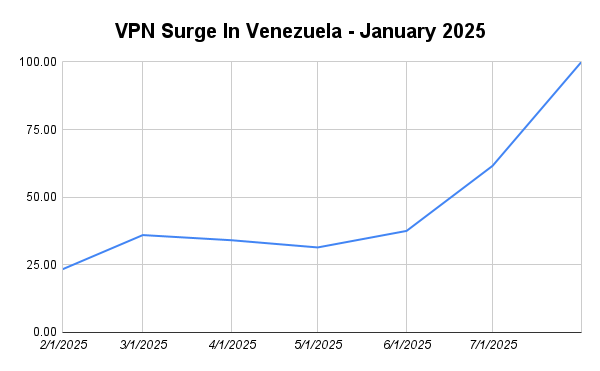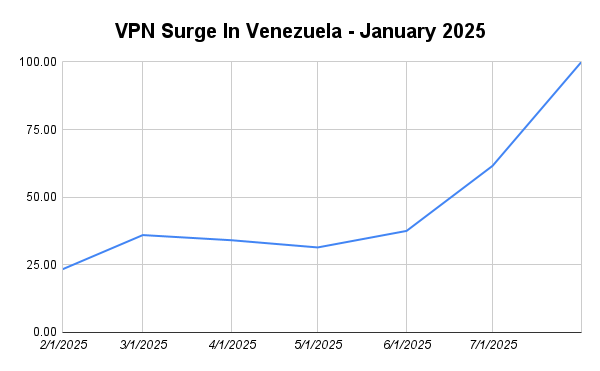What’s Important to Know:
- Venezuela’s Supreme Court fined TikTok USD$10 million for failing to prevent viral video challenges that resulted in the deaths of three Venezuelan children.
- TikTok faced temporary blockades by Internet Service Providers (ISPs) in Venezuela for not paying the fine.
- ISPs used IP, HTTP, and DNS blocks to restrict access to TikTok and other platforms in early January 2025.
- While this latest round of blockades was taking place, protests against Nicolás Maduro’s attempt to retain the presidency of Venezuela were happening across the country. The riot police were deployed in all major cities, looking to quell any protesters.
- A significant surge in demand for VPN services has been observed in Venezuela since the beginning of 2025. Access to some VPN providers’ websites has also been restricted in the country.
In November 2024, Nicolás Maduro announced that two children had died after participating in challenges on TikTok. After a third death was announced by Education Minister Héctor Rodriguez, Venezuela’s Supreme Court issued a $10 million fine against the social media platform for failing to implement measures to prevent such incidents.
The court also ordered TikTok to open an office in Venezuela to oversee content compliance with local laws, giving the platform eight days to comply and pay the fine. TikTok failed to meet the court’s deadline to pay the fine or open an office in the country. As a result, ISPs in Venezuela, including CANTV — the state’s internet provider — temporarily blocked access to TikTok.
The blockades happened on January 7 and later on January 8, lasting several hours each. According to Netblocks.org, various methods were used to restrict access to TikTok, including IP, HTTP, and DNS blocks.
This screenshot shows Netblocks.org report, indicating zero reachability on TikTok using different Venezuelan ISPs.
On January 9, under orders of CONATEL (Venezuela’s telecommunications regulator), CANTV and other private ISPs in the country implemented further blockades to restrict access to TikTok. For instance, they blocked 21 VPN providers along with 33 public DNS services as reported by VeSinFiltro.org.
[…]
vpnMentor’s Research Team first observed a significant surge in the demand for VPN services in the country back in 2024, when X was first blocked. Since then, VPN usage has continued to rise in Venezuela, reaching another remarkable surge in the beginning of 2025. VPN demand grew over 200% only from January 7th to the 8th, totaling a 328% growth from January 1st to January 8th. This upward trend shows signs of further growth according to partial data from January 9th.
The increased demand for VPN services indicates a growing interest in circumventing censorship and accessing restricted content online. This trend suggests that Venezuelan citizens are actively seeking ways to bypass government-imposed restrictions on social media platforms and maintain access to a free flow of information.
[…]
Other Recent VPN Demand Growths
Online platforms are no strangers to geoblocks in different parts of the world. In fact, there have been cases where platforms themselves impose location-based access restrictions to users. For instance, Aylo/Pornhub previously geo-blocked 17 US states in response to age-verification laws that the adult site deemed unjust.
vpnMentor’s Research Team recently published a report about a staggering 1,150% VPN demand surge in Florida following the IP-block of Pornhub in the state.
Source: Venezuela’s Internet Censorship Sparks Surge in VPN Demand

Robin Edgar
Organisational Structures | Technology and Science | Military, IT and Lifestyle consultancy | Social, Broadcast & Cross Media | Flying aircraft


